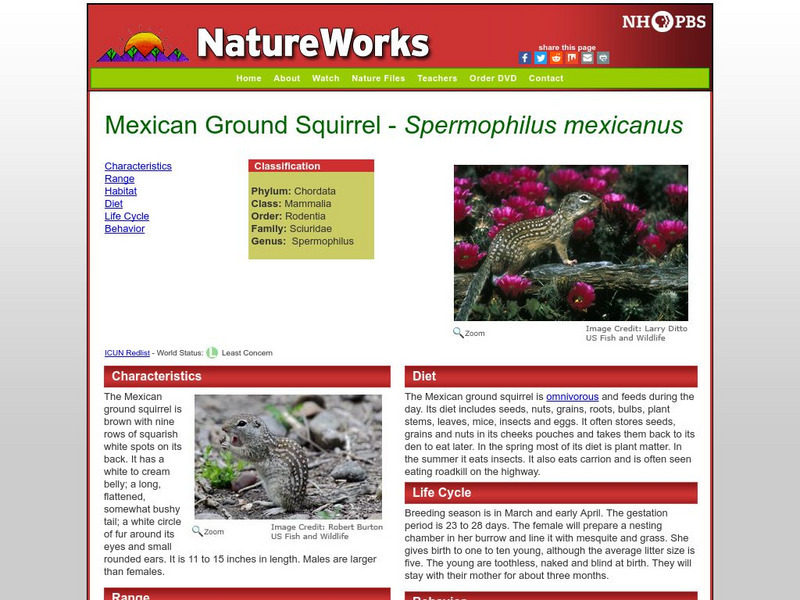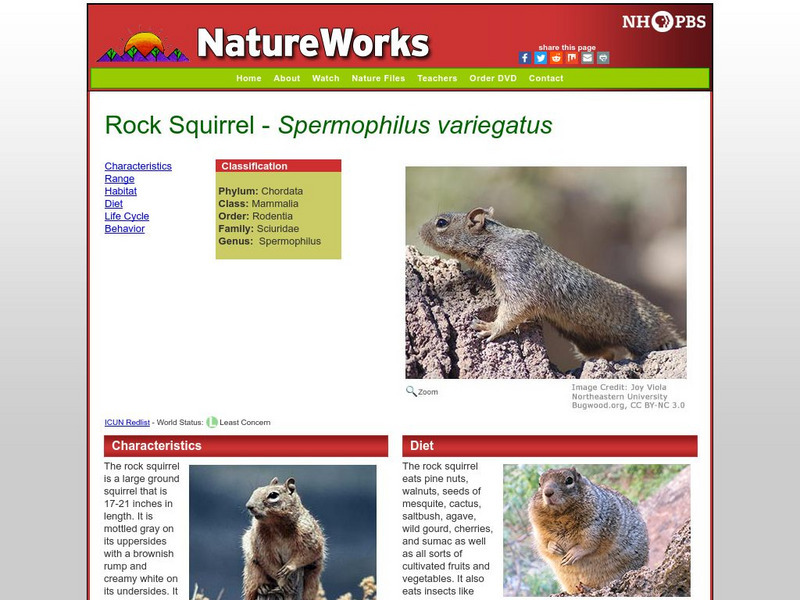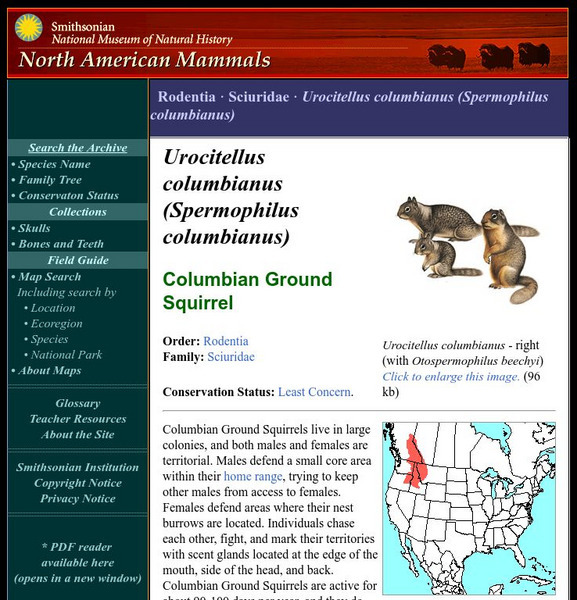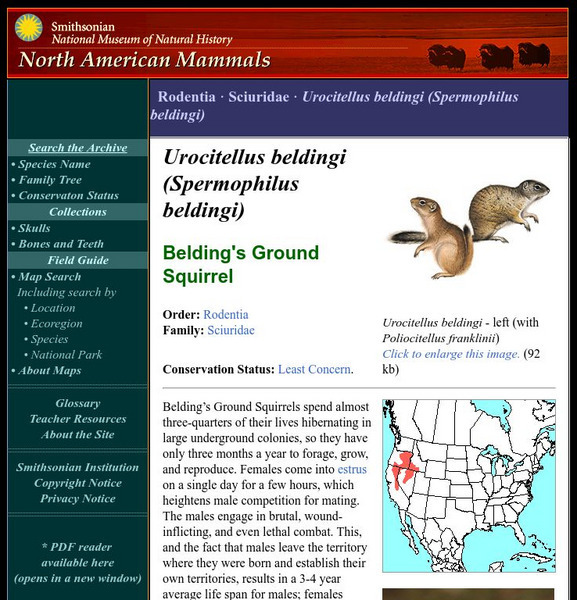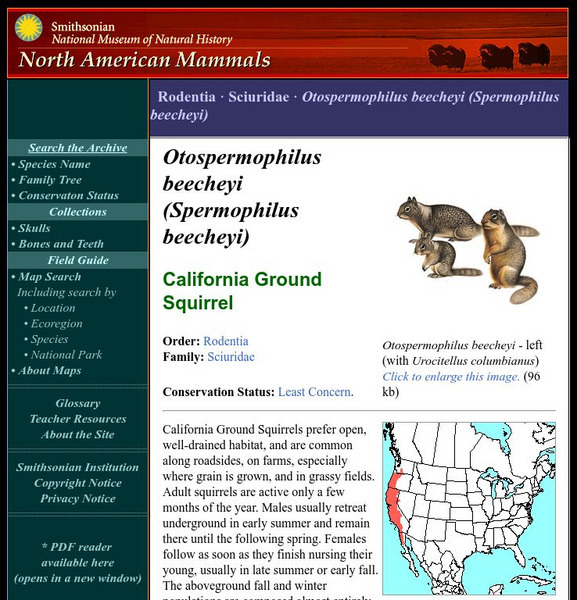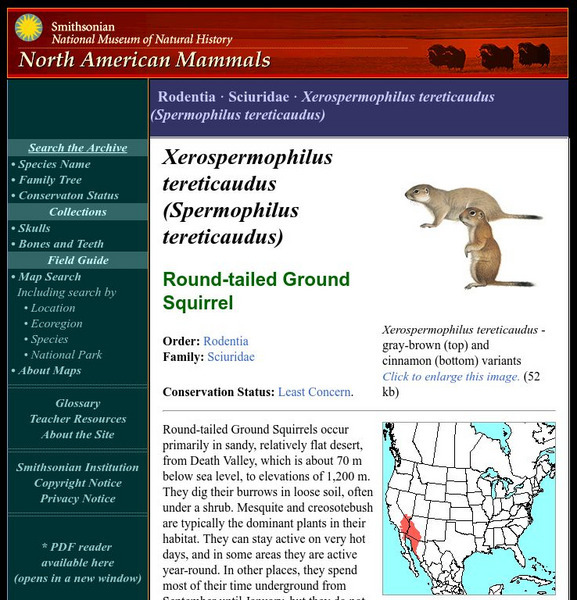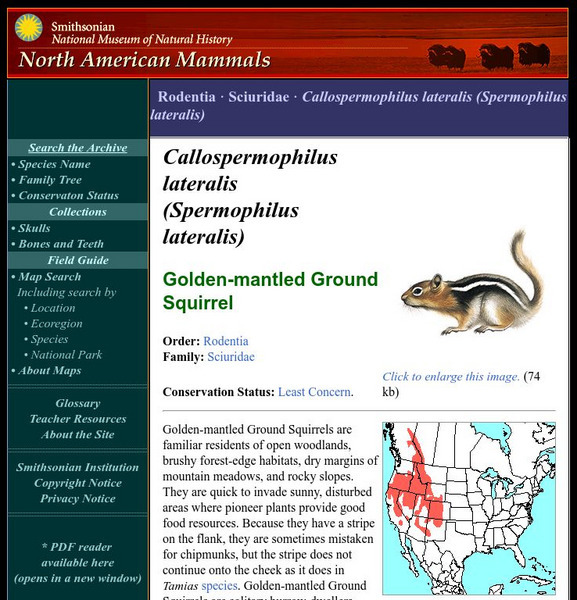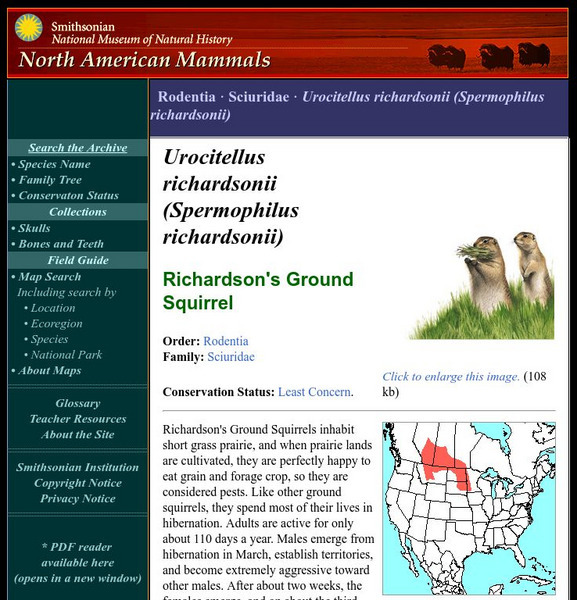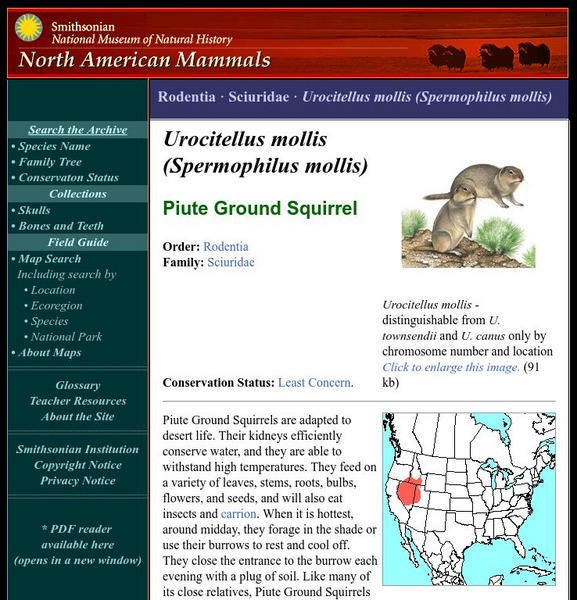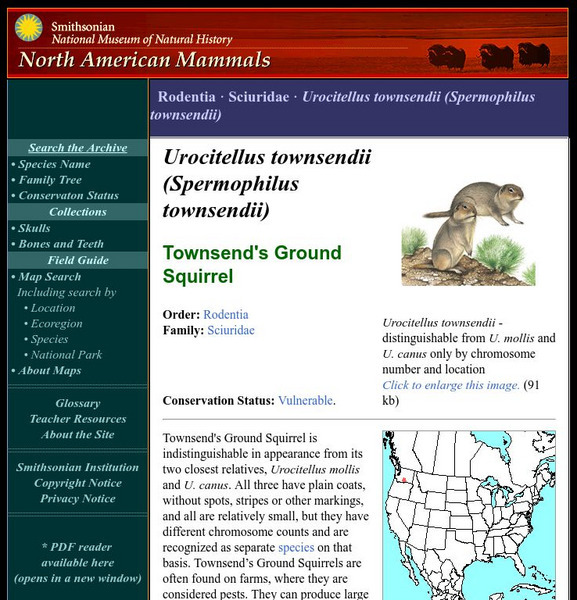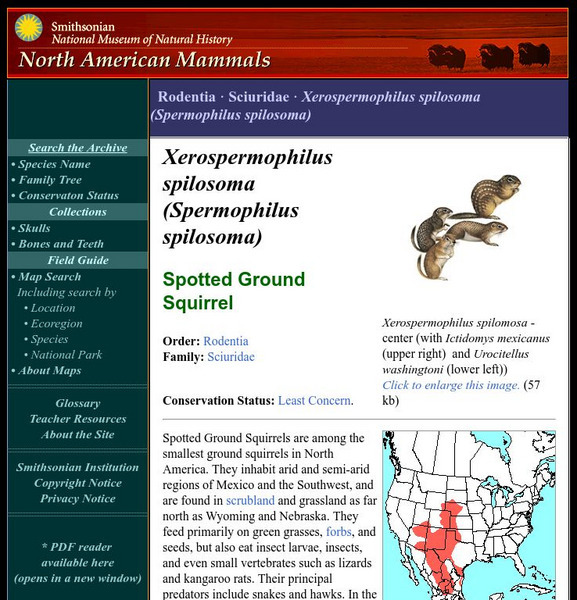PBS
Pbs Learning Media: Squirrel Rehabilitation
This video segment from WILD TV features a family that rescues and releases squirrels to their natural habitat. [4:44]
PBS
Nh Pbs: Nature Works: Golden Mantled Ground Squirrel
This source looks at the Golden-mantled Ground Squirrel. Examine the behavior, characteristics, range, habitat, diet, and life style of this fascinating ground squirrel.
PBS
Nh Pbs: Nature Works: Mexican Ground Squirrel
The Mexican ground squirrel can be found from Northern Mexico north along the Gulf coast of Texas and into western and central Texas and southeastern New Mexico. This resource includes content ranging from characteristics and life cycle...
Canadian Museum of Nature
Canadian Museum of Nature: Arctic Ground Squirrel
The Canadian Museum of Nature provides characteristics of the Arctic Ground Squirrel.
PBS
Nh Pbs: Nature Works: Arctic Ground Squirrel
What makes an arctic ground squirrel unique? This site features information about the reproduction, behavior, habitat, characteristics and more of this fascinating little creature.
PBS
Nh Pbs: Nature Works: California Ground Squirrel
Find out more about the California Ground Squirrel when you explore this educational resource. This site features information on the diet, habitat, characteristics, range, reproduction, and behavior of this mammal.
PBS
Nh Pbs: Nature Works: Rock Squirrel
This site provides a look at the Rock Squirrel. Come and explore the characteristics, life cycle, diet, habitat, behavior and range of this fascinating rodent.
Smithsonian Institution
National Museum of Natural History: American Mammals: Columbian Ground Squirrel
Columbian Ground Squirrels live in large colonies, and both males and females are territorial. Males defend a small core area within their home range, trying to keep other males from access to females. Learn more about the Spermophilus...
Smithsonian Institution
National Museum of Natural History: American Mammals: Arctic Ground Squirrel
Arctic Ground Squirrels must cope with a harsh environment that offers long, cold winters, strong winds, a short growing season, permafrost, poor drainage, and limited cover. The squirrels are, by necessity, dormant for seven months each...
Smithsonian Institution
National Museum of Natural History: American Mammals: Belding's Ground Squirrel
Belding's Ground Squirrels spend almost three-quarters of their lives hibernating in large underground colonies, so they have only three months a year to forage, grow, and reproduce. Females come into estrus on a single day for a few...
Smithsonian Institution
National Museum of Natural History: American Mammals: California Ground Squirrel
California Ground Squirrels prefer open, well-drained habitat, and are common along roadsides, on farms, especially where grain is grown, and in grassy fields. Adult squirrels are active only a few months of the year. Learn more about...
Smithsonian Institution
National Museum of Natural History: American Mammals: Round Tailed Ground Squirrel
Round-tailed Ground Squirrels occur primarily in sandy, relatively flat desert, from Death Valley, which is about 70 m below sea level, to elevations of 1,200 m. They dig their burrows in loose soil, often under a shrub. Learn more about...
Smithsonian Institution
National Museum of Natural History: American Mammals: Golden Mantled Ground Squirrel
Restricted to the Cascade Mountains of Washington State and British Columbia, Cascade golden-mantled Ground Squirrels are so similar to golden-mantled Ground Squirrels that some scientists consider them the same species. However, their...
Smithsonian Institution
National Museum of Natural History: American Mammals: Golden Mantled Ground Squirrel
Golden-mantled Ground Squirrels are familiar residents of open woodlands, brushy forest-edge habitats, dry margins of mountain meadows, and rocky slopes. They are quick to invade sunny, disturbed areas where pioneer plants provide good...
Smithsonian Institution
National Museum of Natural History: American Mammals: Richardson's Ground Squirrel
Richardson's Ground Squirrels inhabit short grass prairie, and when prairie lands are cultivated, they are perfectly happy to eat grain and forage crop, so they are considered pests. Like other ground squirrels, they spend most of their...
Smithsonian Institution
National Museum of Natural History: American Mammals: Piute Ground Squirrel
Piute Ground Squirrels are adapted to desert life. Their kidneys efficiently conserve water, and they are able to withstand high temperatures. Learn more about the Spermophilus mollis, more commonly known as a Piute Ground Squirrel, in...
Smithsonian Institution
National Museum of Natural History: American Mammals: Washington Ground Squirrel
Since the massive conversion of land in the Columbia Basin to agriculture, the Washington Ground Squirrel has been in decline. During the 1980s, the number of localities where they were known to occur dropped from 179 to 35, all small in...
Smithsonian Institution
National Museum of Natural History: American Mammals: Thirteen Lined Ground Squirrel
Thirteen-lined Ground Squirrels are often seen standing on their hind legs on roadsides or other places where grass is mowed, such as lawns, golf courses, or cemeteries. The squirrels probably once lived in short-grass prairie, and some...
Smithsonian Institution
National Museum of Natural History: American Mammals: Townsend's Ground Squirrel
Townsend's Ground Squirrel is indistinguishable in appearance from its two closest relatives, Spermophilus mollis and S. canus. Learn more about the Spermophilus townsendii, more commonly known as a Townsend's Ground Squirrel, in this...
Smithsonian Institution
National Museum of Natural History: American Mammals: Spotted Ground Squirrel
Spotted Ground Squirrels are among the smallest ground squirrels in North America. They inhabit arid and semi-arid regions of Mexico and the Southwest and are found in scrubland and grassland as far north as Wyoming and Nebraska. Learn...
Smithsonian Institution
National Museum of Natural History: American Mammals: Mohave Ground Squirrel
The Mohave Ground Squirrel occupies a relatively tiny part of the Mohave Desert and is rarely seen since it spends more than half the year underground in a burrow. Estivation, the hot-weather equivalent of hibernation, and hibernation...
Smithsonian Institution
National Museum of Natural History: American Mammals: Wyoming Ground Squirrel
Wyoming Ground Squirrels are found in three separate regions of the western United States at elevations above 1,500 meters. Their geographic centers are in southwestern Montana, central and southwestern Wyoming, and southwestern Idaho,...
Smithsonian Institution
National Museum of Natural History: American Mammals: Uinta Ground Squirrel
Uinta Ground Squirrels can live seven years or longer, but few live more than four years. Predation is an important factor. Learn more about the Spermophilus armatus, more commonly known as a Uinta Ground Squirrel, in this easy-to-read...
Smithsonian Institution
National Museum of Natural History: American Mammals: Merriam's Ground Squirrel
Merriam's Ground Squirrels live in high desert habitat dominated by big sagebrush, western juniper, and greasewood, and are also found in grasslands and agricultural lands. They eat grasses and forbs. Learn more about the Spermophilus...




